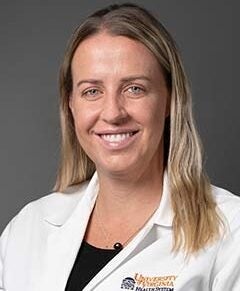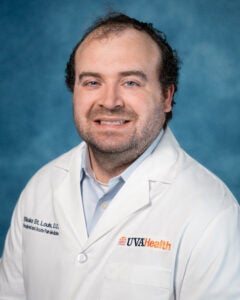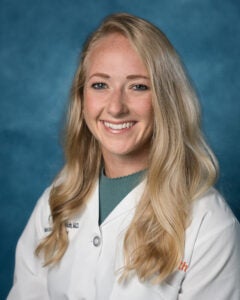Regional Fellowship and Instructorship
Program Directors' Welcome

Brittany Deiling, DO
Anesthesiology Regional Fellowship Assistant Program Director

Brett Elmore, MD
Anesthesiology Regional Fellowship Program Director
Welcome to the University of Virginia (UVA) Department of Anesthesiology Regional Anesthesia and Acute Pain Medicine (RAAPM) Fellowship and thank you for your interest. Our department of approximately 80 faculty includes 11 full-time regional-trained faculty with a wide and representative expertise in many areas. While our RAAPM fellowship training has been in existence since 2009, the program officially became ACGME accredited in 2020, a few years after the specialty was recognized as an accredited fellowship.
Our department now offers 4 positions in RAAPM training: 2 ACGME-accredited fellowship positions and 2 clinical instructorships. Both tracks include dedicated, cutting-edge training in regional anesthesia, but they offer unique differences in operating room anesthesia management options and elective time. Details of the two tracks are included and learn more in the About section below.
Clinical experience within the one-year fellowship will include perioperative rotations focusing on RAAPM at our 32 operating room main hospital campus, our 12 operating room Outpatient Surgical Center (OPSC), and our new stand-alone 6 operating room Orthopedic Center. Trainees will also integrate into Acute Pain Service (APS) which provides care for our medical and surgical patients within our 800-bed hospital. We also pride ourselves on offering fellow-level education in Point of Care Ultrasound (POCUS) techniques to achieve certification in this area.
Read MoreApply to Our Program
Apply for the ACGME Regional and Acute Pain Fellowship
Apply HereACGME Regional and Acute Pain Fellowship Applicants MUST Apply via the SF Match Online Portal. SF Match requires the following information when applying to our program:
- Application
- Employment Information
- 3x Letters of Recommendation
- Exams and Certifications
- Publications Personal Statement
- Education Information
- Required Supplemental Form
- Hobbies and Interests
Please contact our program for any questions or the need for assistance: anesthesiology-regionalfellow@virginia.edu and include “ACGME Regional Fellow applicant” in the subject heading. Please note: ALL our positions are FULL for the 2025-26 academic year. We will begin reviewing applications for the 2026-27 academic year in early Spring. Current University policy requires all applicants to be Board Eligible, which requires completion of an ACGME accredited anesthesiology residency program.
Apply for the ACGME Regional and Acute Pain Fellowship
Apply HereClinical Instructorship in Regional Anesthesia & Acute Pain Medicine
Apply to the Clinical Instructorship
Apply HereOur Clinical Instructorship (CI) includes a fully-immersive RAAPM educational experience with the addition of approximately one day of operating room anesthesia management per week. Those days may include supervision of multiple anesthesia sites supervising residents/CRNAs or solo anesthesia management of a single room.
- Clinical instructors do not receive priority for non-clinical time considerations
- Clinical instructors are eligible to pursue supplemental shift opportunities within our department for additional pay
- 22 days of vacation/year
- Salary is $120,000/year before supplemental shift pay
The CI position is appointed directly by the Department of Anesthesiology. We perform in-
person interviews for this position. The application process begins with the ASRA Common Application found at this link. Please also attach the common application, a CV, licensing exam transcripts, and 3x letters of recommendation to anesthesiology-regionalfellow@virginia.edu with “CI Regional Fellow applicant” in the subject heading. Current University policy requires all applicants to be Board Eligible, which requires completion of an ACGME accredited anesthesiology residency program.
Apply to the Clinical Instructorship
Apply HereAbout
Click here to view the Regional Fellowship and Instructorship Regional Division Faculty Bios.
2025-2026 ACGME Fellows
-
Nazar Dubchak, DO
Rocky Vista University in Parker, Colorado;
Walter Reed National Military Medical Center Residency
-
Blake St. Louis, DO
University of North Texas
– Texas College of Osteopathic Medicine;
Medical College of Georgia Residency
-
Alexandra (Ali) Seferovich, MD
George Washington University;
University of Virginia Residency
-
Justin Genova, MD
Saint Louis University,
University of Maryland Residency
Our accredited fellowship adheres to the ACGME program requirements for our field (Updated 7/1/2022):
- Fellows are fully-immersed in RAAPM education. Historically, our fellows have far exceeded the required numbers of procedures.
- Non-clinical time is available for our fellows to pursue academic interests.
- There are no in-house night or weekend requirements for our fellows.
- Fellows who are eligible for independent licenses have the opportunity to pursue departmentally-supported internal moonlighting that does NOT interfere with fellowship training.
- We offer financial support for meetings and educational resources.
- Fellows can expect to have 4 weeks of vacation and 4 weeks of elective time.
- Salary details for this PGY-5 position can be found at this link.
RAAPM Rotation Goals
The Main Operating Room (OR) Regional Rotation is a four week rotation that the fellows will rotate through during their fellowship training. During this time, fellows will master the knowledge and skills necessary to evaluate and manage the care of patient undergoing both inpatient and outpatient surgery with a focus on regional anesthesiology and acute pain management techniques.
Fellows will demonstrate an understanding of the specific needs of peri-operative and medicine patients tailoring pain control techniques to facilitate efficiency and safety. Orthopedic, Vascular, General Surgery, and Plastic surgery patients will constitute a large component of the inpatients.
Fellows will provide single shot as well as continuous catheter techniques for patients and will orchestrate care with primary surgical teams and nursing. In addition, the fellows will serve as consultants of non-operative patients and pain management needs and will provide regional and acute pain techniques as indicated.
The expectation is that the experience will culminate in the fellow ultimately being able to manage the anesthetic plan for both surgical and non-surgical patients, and to operate effectively and independently under the supervision of an attending anesthesiologist. Along with weekly Grand Round lectures, you will also have weekly didactic lectures. While doing your fellowship here you will rotate in the following:
- Main Regional OR
- Out-Patient Surgery Center
- Acute Pain Service
Professionalism
- Demonstrate respect, compassion, integrity, reliability, and dependability in their role as an anesthesiologist
- Respond in a timely manner to requests by surgeons and nurses for assistance in patient management issues
- Provide follow up on patients and any complications or patient concerns
- Exhibit the ability to make more independent decisions about patient management
- Demonstrate leadership of daily rounds and the priorities for addressing all care needs over the course of the day
- Serve as mentor to junior residents/students concerning aspects of APS work
Patient Care and Procedural Skills
- Provide routine management of the analgesic needs of patients undergoing surgical procedures and medical patients
- Perform a detailed patient history and physical including neurologic history
- Understand appropriate analgesic choices including regional techniques and multi-modal techniques
- Accurately obtain, interpret and apply information about analgesic options
- Formulate a regional anesthesia plan for both surgical and medical patients
- Formulate a multi-modal analgesic plan for surgical patients and inpatients
- Identify patients who can undergo a regional technique as the primary anesthetic
- Demonstrate competence in performing blocks of the brachial plexus including interscalene, supraclavicular, infraclavicular, axillary and forearm blocks
- Demonstrate competence in performing blocks of the lower extremity including femoral, saphenous, sciatic and ankle blocks
- Demonstrate competence in performing truncal blocks including TAP, erector spinae and paravertebral blocks
- Follow up all techniques including the following of and management of any complications
- Apply current body of literature in the management of surgical and medical patients and their analgesic needs
- Understand orthopedic-specific medical management
Practice-Based Learning
- Demonstrate consultant quality evaluation and treatment planning skills
- After discussion with the APS Attending, perform the epidural placement with less hands-on intervention from the attending
- Utilize a wider range of adjunctive therapies for pain management
- Demonstrate more leadership skills in the daily provision of service
- Obtain consultations for more sophisticated therapy, as deemed necessary
- Follow up on nerve blocks and discuss opportunities for improvement
- Demonstrate proficiency in reading scientific literature and applying choosing analgesic options for patients
Interpersonal Communication
- Obtain information from patients and provide effective communication with patients and their families
- Provide appropriate communication with surgical teams when caring for patients
- Demonstrate ability to coordinate care by communicating with nursing staff in the pre-operative, intra-operative and post-operative care areas
- Obtain informed consent from patients and families
- Manifest consultant level of interaction with patients and staff
- Evidence concern for the effectiveness of information-sharing with patients, families and colleagues
Medical Knowledge
- Create a differential diagnosis for the causation of a patient’s pain and suggest a plan for focusing on ‘the’ working diagnosis for which primary treatment will be targeted
- Establish an awareness of a broader spectrum of therapeutic modalities for pain management, including pain psychology
Systems-Based Practice and Improvement
- Understand your role as patient care advocate
- Become familiar with costs associated with specific interventions
- Emphasize safety and well-being of patients in the hospital setting
- Demonstrate an understanding of continuous nerve catheters, their risks and benefits to patients
- Demonstrate familiarity of best practice regarding regional anesthesia and anti-coagulation
- Describe Local Anesthetic Systemic Toxicity treatment plan and how to utilize available resources to optimize patient safety
- Provide more evidence of self-directed learning
- Evaluate/critique the relevant pain medicine literature
- Demonstrate awareness of options for care in published guideline documents
- Understand the vital role that pain management plays in healthcare, thus the need for effective management of acute pain
- Manifest greater appreciation for the array of services at the UVA Health System that can be brought to bear on the patient’s behalf
Fellows will be expected to achieve competence in pain assessment, formulation, and coordination of a multiple modality treatment plan, integration of pain treatment with primary disease management and palliative care, and interaction with other members of the multidisciplinary pain team. The didactic and clinical curriculum will address the attainment of these competencies and the assessment of fellow performance will be based on the successful achievement of the following ACGME and ABA (The American Board of Anesthesiology) specialty-specific competencies and attributes.
The out-patient Continuity Clinic runs full days (0800 – 1700) four days of the week at the Pain Management Center. On Wednesdays, both start at 12:30 to permit attendance at the Anesthesiology departmental morbidity and mortality and grand rounds conferences which run from 0700 – 0845. These are followed by dedicated pain medicine lectures at the Pain Center from 0930-1130. The IASP (International Association for the Study of Pain) and American Board of Anesthesiology curriculum outlines provide the essential topic structure for the conference presentations.
APS Rotation Goals
- Expand, broaden and strengthen the knowledge and skills gained in the first or second APS rotation
- Highlight advanced patient assessment/evaluation techniques
- Demonstrate improved technical performance in the provision of needle-based care, particularly epidural techniques
- Manifest greater participation in the decisions for daily management of patients as well as the utilization of a wider range of diversified therapeutic modalities
- Take more responsibility for handling patient follow-up actions and acute pain consults
- Evidence more autonomy in patient management
Strive to integrate more input from literature review into the care of patients - Demonstrate the ability to teach information related to APS care
Applications are reviewed on a rolling basis and selected candidates will be invited to interview in March/April for both the Fellowship positions and the Clinical Instructor position. Both types of positions follow the typical academic cycle from July 1 to June 30, though an August start date may be acceptable if approved by the Program Director in advance.
Institutionally, we sponsor the J1 clinical visa. All graduates of international medical schools must hold a valid certificate issued by the Educational Commission for Foreign Medical Graduates (ECFMG) to be appointed as a resident or fellow, following the ACGME and VA Board of Medicine requirements.
For additional information, please contact the Fellowship Program Director, Dr. Brett Elmore, or the Regional and Acute Pain Medicine Fellowship Coordinator, Lisa Morton, by phone at 434.924-9454, or by email at anesthesiology-regionalfellow@virginia.edu.




